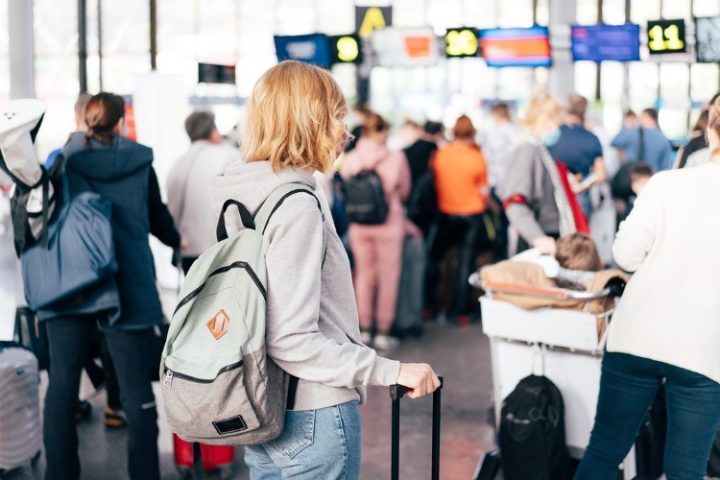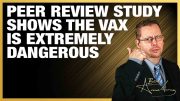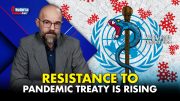
Americans should “practice enhanced precautions” when traveling to avoid being infected with monkeypox, the U.S. Centers for Disease Control and Prevention (CDC) announced Monday while the Biden administration is sending monkeypox vaccines across the country for people who have had high-risk exposures to the virus.
According to the CDC guidance that now recognizes monkeypox as a Level 2 concern, travelers should avoiding close contact with sick animals and people, especially those with skin lesions. As seen from the page archive on Monday, the CDC also urged people to wear masks, yet on Tuesday, this point was removed from the advisory with no explanation.
Elsewhere on its website, the CDC notes that the virus enters the human body through broken skin, the respiratory tract, or the mucous membranes (eyes, nose, or mouth). While the virus travels on large respiratory droplets, “prolonged face-to-face contact is required” to pass it from one person to another.
In May, the agency posted a monkeypox factsheet (pdf) for “people who are sexually active,” where it says that this disease “can spread to anyone through close, personal, often skin-to-skin contact.” That includes direct contact with infectious sores through sexual contact, kissing, hugging, massage, close talking, and touching private parts of the infected.
“It’s not clear how the people were exposed to monkeypox, but early data suggest that gay, bisexual, and other men who have sex with men make up a high number of cases,” observed the CDC.
Therefore, wearing masks to protect oneself from catching monkeypox while traveling makes no sense, indeed, if a traveler does not engage in casual unprotected gay sex with strangers.
Noting that “some [monkeypox] cases were reported among men who have sex with men,” while some were reported in people who share a household with an infected person, the CDC said in its Monday advisory that the “risk to the general public is low.”
The heightened alert encourages travelers to avoid close contact with sick people, including those with skin or genital lesions, as well as dead or live wild animals. It also urges people to avoid eating or preparing meat from wild game or using products derived from wild animals from Africa (creams, lotions, powders), and sharing personal items with infected individuals (bedding, clothing, etc.),
Those displaying symptoms of the virus, such as an unexplained skin rash or lesions, should avoid travel and contact with others and should reach out to their healthcare provider for guidance. The latter should be notified if a potentially infected person is gay, traveled to the country where monkeypox cases were reported, or was in contact with someone infected.
Besides the United States, the CDC lists 28 countries where 1,019 cases have been reported. As of Monday, the U.K. had recorded the most cases, with 302 confirmed infections. It is followed by Spain with 198, Portugal with 153, Canada with 80, and Germany and France with 65 and 51, respectively.
So far, there have been 30 confirmed cases in the United States. Most of the cases — seven — were reported in New York. This was followed by California with six and Florida with four.
So far, the source of the outbreak is unknown. Historically, it has been linked to travel from endemic countries. According to the analysis of a May 23 report from the Portuguese National Institute of Health done by Dr. Robert Malone, the monkeypox outbreak in Europe comes from a single original virus either from West Africa or the U.K., Israel, or Singapore.
The unsettling observation about the virus, however, reveals that its genome is either evolving more rapidly than one would expect or comes as a result of laboratory manipulation of this particular clade (strain).
Adding to the confusion, the CDC said last Friday that at least two genetically distinct monkeypox variants are circulating in the country.
Last week, the World Health Organization’s monkeypox lead, Dr. Rosamund Lewis, said that the virus could have been spreading within non-endemic countries for “months or years” undetected, according to CNBC.
Lewis and other WHO officials noted that while the disease usually resolves on its own with no specific treatment and no deaths have been reported in Western countries yet, it might become severe. For now, the WHO signaled that mass vaccination is not needed since the disease is limited to a “specific community.”
Last week, the Biden administration delivered 1,200 doses of the JYNNEOS® vaccine and 100 treatment courses for monkeypox, according to the White House’s senior director for global health security and biodefense, Dr. Raj Panjabi.
“We want to offer vaccines to people who’ve had high-risk contact with infected individuals to help prevent more onward transmission of the virus,” Panjabi announced.
As reported by The New American, at the end of May, when the first monkeypox case was reported in the United States, the administration ordered 13 million additional doses of the JYNNEOS® monkeypox vaccine from Denmark-based biotech company Bavarian Nordic A/S.
According to CNBC, since 2010, the United States has ordered nearly 30 million JYNNEOS® doses, 28 million of which have already expired. Since 2001, the company received well over $100 million in grants from the National Institute of Allergies and Infectious Diseases (NIAID), headed by Dr. Anthony Fauci, for developing anti-terrorism biodefense medications and vaccines. It is unknown if NIAID receives any royalties for the vaccines developed by Bavarian Nordic.




